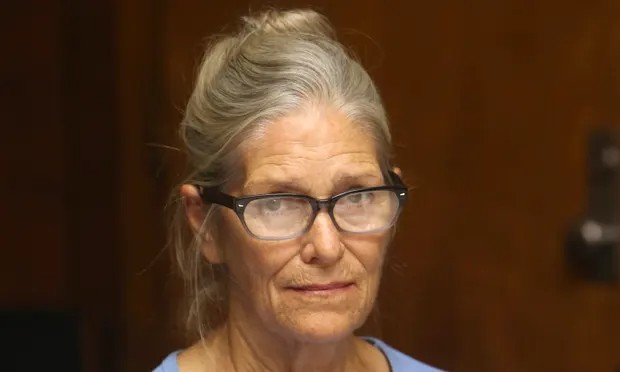Van Houten, now 73, is out on parole after her conviction for participating in the 1969 LaBianca murders at age 19
Leslie Van Houten, who was sentenced to life for participating in the infamous murders by the Charles Manson cult when she was 19, walked free from a California prison on Tuesday after 53 years behind bars.
Van Houten, now 73, was convicted for helping Manson’s followers carry out the 1969 killings of Leno LaBianca, a grocer in Los Angeles, and his wife, Rosemary.
She was released from prison in the early morning hours and is now at a transitional housing facility, her attorney, Nancy Tetreault, said. She will be under parole supervision.
The state’s parole board had ruled on five separate occasions, first in 2016, that she was “suitable” for release and not a danger to society, but each time the governor’s office vetoed the decision and ordered she remain incarcerated. Her attorneys challenged the vetoes, and in May, a state appeals court sided with Van Houten, ruling she should be freed. The court noted her accomplishments behind bars, including working as a tutor, earning a master’s degree in humanities and participating in a range of mental health and self-help programs.
Van Houten had also received only one write-up in 1981 for “verbally communicating with women”, but otherwise had no disciplinary record over more than five decades in prison, the LA Times reported.
“She’s really thrilled, but she’s been in prison for 53 years and turns 74 next month so this is a huge change,” Tetreault told the Guardian on Tuesday afternoon. “She’s gratified that people are recognizing that she’s completely reformed, because she really is. I’ve never had a client who has dedicated herself to reform like she has. She spent 40 years in therapy and 30 years in what they call rehabilitative programming.
“She fell under the influence of Charles Manson and participated in these horrible murders … and she worked really hard to get past that cult indoctrination and to understand it and take responsibility. And she had to confront her feelings of crushing guilt over what she did. She’s very remorseful,” Tetreault continued. “I think she’s just happy that her crimes are no longer defining her.”
Governor Gavin Newsom, who has strongly opposed her release, said last week he was disappointed that the courts ruled in her favor, but said he would not appeal the latest decision since he would be unlikely to succeed.
“More than 50 years after the Manson cult committed these brutal offenses, the victims’ families still feel the impact, as do all Californians,” Newsom’s spokesperson told the Guardian last week.
Manson died behind bars in 2017 at age 83 after nearly 50 years in prison. Patricia Krenwinkel, another former Manson follower convicted of murder, was granted parole for the first time last year, but Newsom blocked her release. Susan Atkins, who was convicted of eight murders, died in prison in 2009.
Tetreault noted that Van Houten had gone before the parole board 21 times before they found her suitable to come home and that since 2016, officials have consistently acknowledged her progress and achievements: “The board was really committed to her release and they said that they were proud of her. Because she dedicated herself to rehabilitative programming, she was able to change. The parole board sees her, and I do too, as giving hope to young people in prison after committing horrible crimes – that they can reform and get parole and a chance at a decent life.”
It will be a long process adjusting to life outside prison walls for Van Houten, the attorney added: “She doesn’t know how to use a computer or a cellphone or how to buy things without cash money or negotiate a supermarket.”
Van Houten’s case has long drawn national attention, and Cory LaBianca, Leno’s daughter who is now 75, said last week she was “heartbroken” about her pending release, telling the AP: “My children and my grandchildren never got an opportunity to get to know either of them, which has been a huge void for my family.”
Criminal justice reform activists who advocated for her release have argued Van Houten’s case exposed flaws in the state’s parole process where elderly incarcerated people can be denied release even after a state board rules that they are rehabilitated and pose no threat. Governors have regularly vetoed parole grants in high-profile and politicized cases.
California, like states across the country, is home to an ageing population behind bars of people serving lengthy or indefinite sentences, with minimal opportunities to come home, creating what civil rights lawyers say has become a humanitarian crisis.
“I think people need to be mindful that these long sentences are more about retribution than they are about rehabilitation,” Tetreault said.
Source: The Guardian



Recent Comments